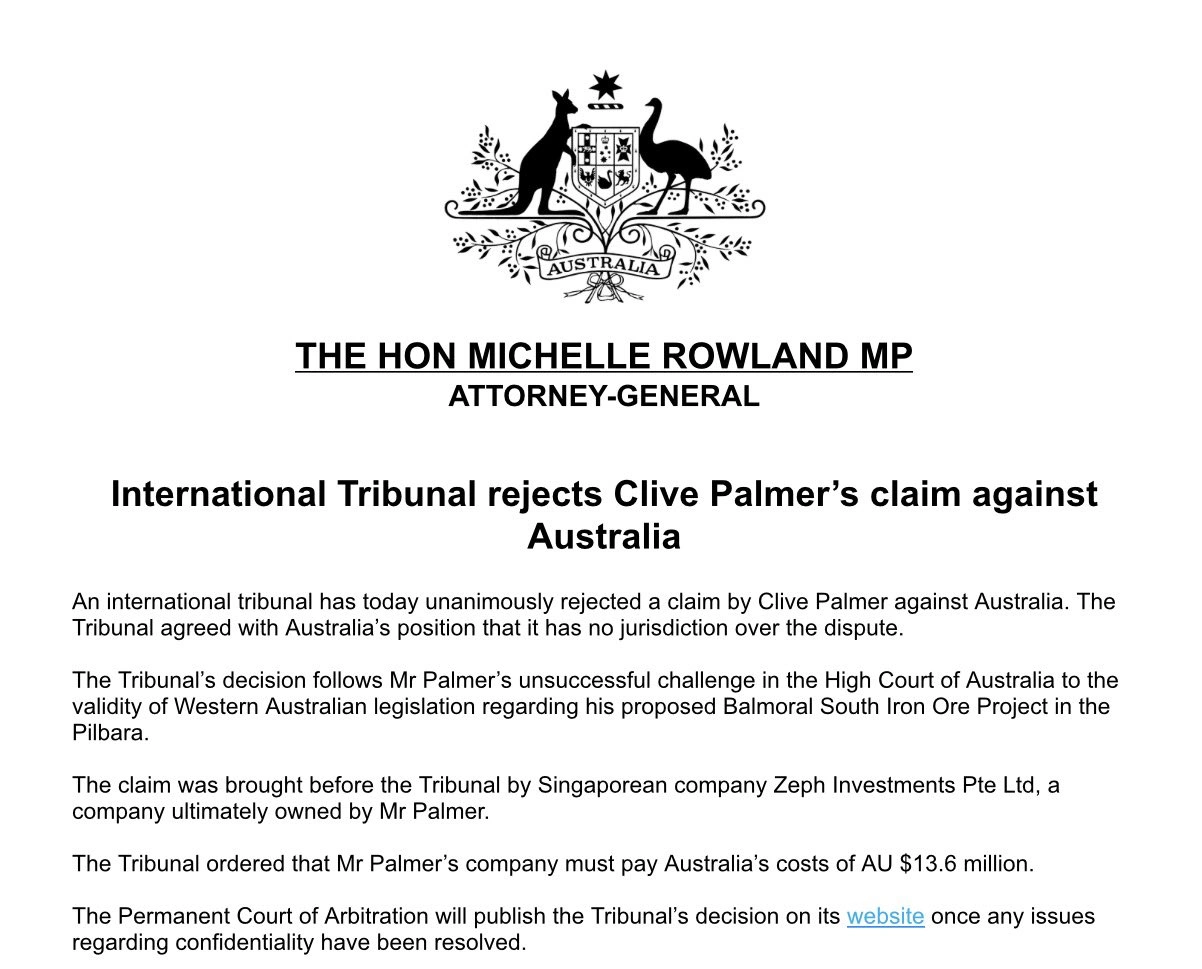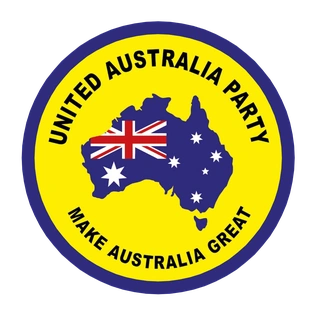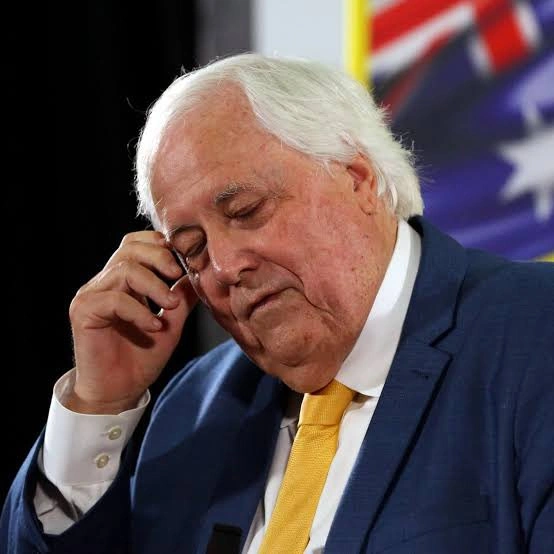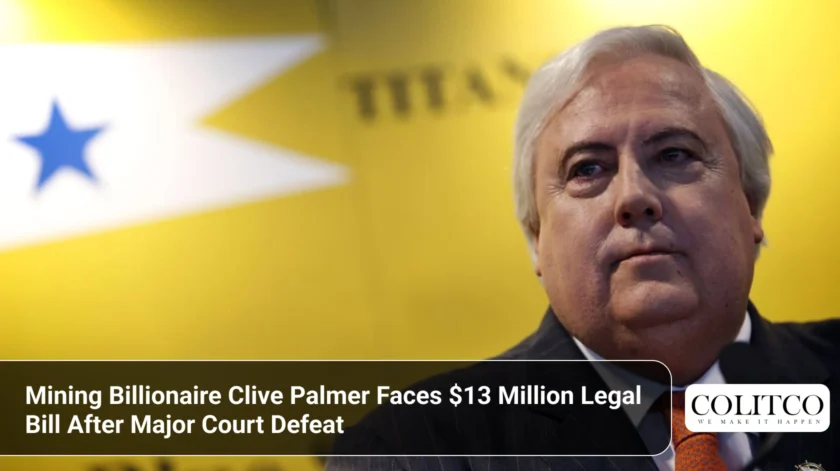Australian mining magnate Clive Palmer has been dealt a crushing blow after an international tribunal ordered him to pay $13.6 million following the dismissal of his controversial “foreign investor” claim.
The Permanent Court of Arbitration rejected Palmer’s attempt to sue the Australian government for $305 billion in damages over a blocked mining project in Western Australia’s Pilbara region. Attorney-General Michelle Rowland announced the tribunal’s decision on Saturday, stating that Palmer is “not a foreign investor and is not entitled to any benefits under Australia’s free trade and investment agreements.”
The massive penalty caps a decade-long legal saga that began in 2012 when Palmer’s Balmoral South iron ore project was initially rejected by the Western Australian government.
The Decade-Long Mining Dispute That Cost Millions
The dispute between Palmer and the WA government began in 2012 over an iron ore project in the Pilbara. Palmer argued his development proposals for the Balmoral South iron ore project were unlawfully refused by the previous state government.

International Tribunal rejects Clive Palmer’s claim against Australia
Palmer’s Singaporean investment company claimed damages totalling almost $305 billion after the mining proposal was blocked, arguing breaches of the ASEAN-Australian-New Zealand free trade agreement.
The case escalated when the WA parliament passed the so-called Mineralogy Act in 2020, which sought to protect the state from having to pay any damages to Palmer. Palmer subsequently took his case to international arbitration, claiming the blocking process was “akin to the actions of a banana republic.”
The tribunal’s decision, yet to be made public, ordered Palmer to pay costs of $13.6 million, with the government having spent two years and over $13 million defending an investor-state claim brought by an Australian national.
Palmer’s Failed “Foreign Investor” Strategy Backfires
The international tribunal’s rejection centres on Palmer’s attempt to circumvent Australian courts by claiming foreign investor status through his Singaporean company structure.
It appears that ownership of Palmer’s Australian companies, including Mineralogy, was transferred to a Singaporean company – Zeph Investments – in 2019 (or possibly as early as 2017). However, the tribunal found this arrangement insufficient to establish genuine foreign investor credentials.
UNSW law expert Jonathan Bonnitcha explained the unusual nature of the case: “It’s a way to basically internationalise a dispute. The arbitration court operated under a very unusual system of treaties between governments that allowed foreign investors to sue the state they invested in, outside of that state’s courts.”
The ruling represents a significant victory for Australia’s sovereignty, with the government hoping it will prompt Palmer to withdraw other international claims against the Commonwealth.
Political Setbacks Mount for Palmer’s Electoral Ambitions
Palmer’s legal defeat comes amid ongoing challenges to his political aspirations. In February 2025, the High Court blocked his attempt to re-register the United Australia Party for the upcoming federal election, forcing him to establish the new “Trumpet of Patriots” party.
Despite an estimated $100 million advertising campaign at the 2022 election, the UAP failed to win any seats in the House of Representatives and only won a single seat in the Senate.

The mining billionaire’s political messaging has drawn scrutiny for its contradiction with his legal strategy. His foreign investor claim jarred with much of his often nationalistic political messaging, with experts noting “Those ads don’t generally say a lot about suing the Australian government for hundreds of billions of dollars.”
Palmer’s Trumpet of Patriots party has struggled to gain traction, with limited candidate registrations and facing the same fundamental challenges that plagued his previous political ventures.
Mining Industry Implications and Government Response
The case has broader implications for Australia’s mining sector and foreign investment framework. Palmer has claimed the Mineralogy Act would deter companies from investing in WA, but whether the new law – or the High Court judgement – undermines investor confidence in the state remains to be seen.
The government’s successful defence demonstrates the limits of investor-state dispute settlement mechanisms when applied to domestic disputes masquerading as foreign investment claims.
The case also highlights ongoing tensions in Australia’s mining sector, where disputes between companies and governments continue to shape the regulatory landscape.
Attorney-General Rowland emphasised the precedent: “Australia should never have had to spend two years and over $13 million defending an investor-state claim brought by an Australian national.”
Financial Impact and Future Prospects
Palmer’s spokesman confirmed the billionaire would review the tribunal’s judgment, though options for appeal appear limited given the unanimous nature of the decision.
The $13.6 million penalty adds to Palmer’s mounting legal costs from various disputes, including ongoing cases related to his Queensland Nickel operations and other mining ventures.
Despite these setbacks, Palmer remains one of Australia’s wealthiest individuals with substantial iron ore holdings in the Pilbara region through his Mineralogy company.

The case underscores the risks facing mining companies that attempt to bypass domestic legal systems through complex corporate structures designed to claim foreign investor protections.
Final Thoughts
The tribunal’s decisive rejection of Palmer’s foreign investor claim marks a watershed moment in one of Australia’s most contentious mining disputes. The $13.6 million penalty serves as a stark reminder that attempts to circumvent domestic legal systems through artificial foreign investment structures will face robust challenge from Australian authorities.
For Palmer, the defeat represents not just a financial setback but a fundamental rejection of his legal strategy that has dominated headlines for over a decade. As Australia’s mining sector continues to navigate complex regulatory environments, this case establishes important precedents for genuine foreign investment versus manufactured offshore structures.
Also Read: Diplomats Abandon Assembly Hall as Netanyahu Delivers Defiant UN Speech
Frequently Asked Questions
Q: Why was Clive Palmer ordered to pay $13.6 million?
A: An international tribunal rejected Palmer’s claim to be treated as a “foreign investor” in his dispute with the Australian government, ordering him to pay the government’s legal costs.
Q: What was the original dispute about?
A: Palmer’s iron ore mining project in Western Australia’s Pilbara region was blocked by the state government in 2012, leading to a decade-long legal battle.
Q: How much was Palmer originally claiming in damages?
A: Palmer’s Singaporean company sought almost $305 billion in damages from the Australian government.
Q: Can Palmer appeal this decision?
A: The tribunal’s decision was unanimous and appears final, though Palmer’s representatives have indicated they will review the judgment.
Q: What does this mean for Palmer’s political ambitions?
A: Combined with his High Court defeat over party registration, this represents another significant setback to Palmer’s political activities.











